
eXtensions - Sunday 13 April 2025
By Graham K. Rogers

I advise students writing proposals that their work should be able to convince managers, humanities graduates or even accountants because they control the purse. Apple engineers have now learned the same lesson. New AirPods this week, but I prefer the old ones for several reasons. Adobe was given a lesson in PR recently. Advocating for the Watch: a lifesaver. Tariffs: ad hoc economics?
I am currently busy guiding engineering students who are writing project proposals. A major problem with these students, is illustrated by a slide heading I use: "I am not inside your brain." They think that, because they understand the ideas they are trying to put into a project, everyone will. This leaves the content devoid of many useful or necessary details.
 In trying to make these young engineers understand the importance of full information, I illustrate the ideas in a couple of ways. During consultations, I ask, "Would your mother understand this?" which usually produces a smile and some acceptance that perhaps a little more is needed.
In trying to make these young engineers understand the importance of full information, I illustrate the ideas in a couple of ways. During consultations, I ask, "Would your mother understand this?" which usually produces a smile and some acceptance that perhaps a little more is needed.
A second approach concerns the idea that when they graduate and (perhaps) work for an organization they will then have to write proposals for new products or ideas that they have. Unlike the current proposal, I explain - written for engineering teachers who understand the technology - in a company, some of those reading the proposal will not have engineering degrees: MBAs, accountants, managers, humanities graduates. Unless the proposal convinces these people, particularly the accountants, then it may not fly.
It turns out that I was right. As William Gallagher (AppleInsider) reports, the shortcomings in Apple Intelligence and Siri are because "Apple was too miserly to spend some cash years ago" and that Luca Maestri (CFO) "halved a budget that engineers had wanted for buying GPU processors" even though Tim Cook had already said, Yes. Debating why this would happen, one possibility is that "the engineers didn't make a good enough case". I have sent the article link to my students.
We can expect an update to iOS in a week or so, Joe Rossignol (MacRumors) reports. It looks as if a number of bugs will be attended to, but the problem I found, when the Recents folder in Files on the iPhone and iPads were changed so that the most recent was over a month before (and not the day before), has not been noted in any reports I have seen. Thus far, as I have worked on files, so they have appeared in the Recents folder, which is as it should be. No files were lost in that last update, but to find the files I had to burrow down to the respective folders which cost time. That is why we have a Recents folder.
I bought a new set of AirPods. I became aware that the battery had degraded, but on my way into Bangkok this week, I was only able to run the devices for 20 minutes. Since I bought the last set (2021), the design has changed. I am not happy with the physical changes or the controls. The shorter leg and slightly fatter earpiece make it harder for me when removing or replacing the AirPods from the charging case and I have dropped them several times. The case itself, however, has been improved with its slightly fatter shape and the addition of a light to show charging status: long overdue.
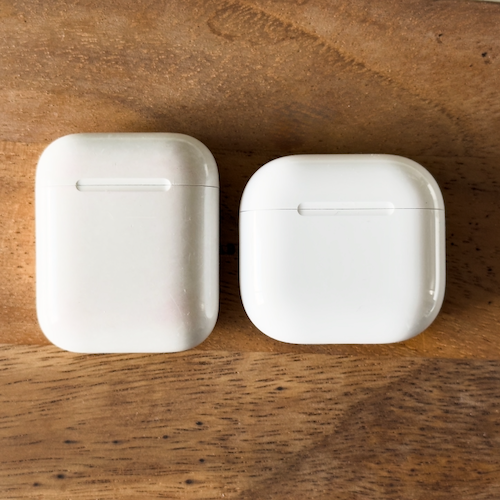
|
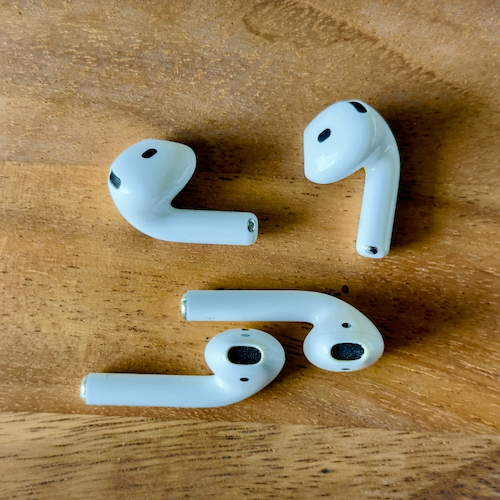
|
The controls have also changed. One new option I tried was Personalized Volume which changes sound levels depending on the environment. I tried this on the BTS metro, but by the time I had done only half the journey, I turned it off. As outside volume levels in Bangkok can change quite dramatically, I kept having to turn the music down, then up, even when just stopping at a station.
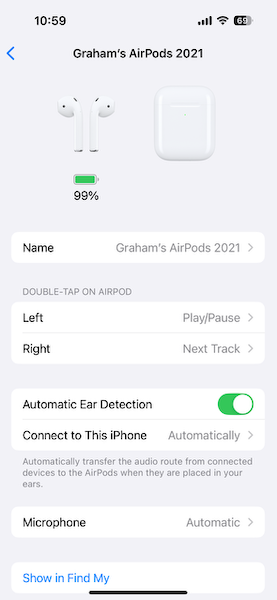
|
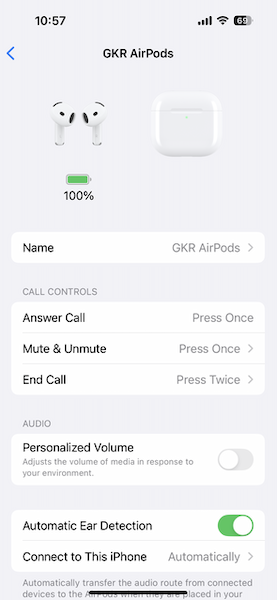
|
With the old AirPods I could stop or start music with a double tap. There appears to be no such control on the new AirPods. Instead there are Call Controls. As I am far less likely to be answering the phone than listening to music, this has proved less than convenient, particularly when out and about. I like to turn the sound off when speaking to people (that is only polite, after all). This is no longer just a quick double tap. If I am controlling the music via the Apple Watch, that is fairly easy, but it does involve a different set of movements. Only after some experimentation did I find that when exercise is displayed on the watch, I can scroll between the screens. I learned something new, but also lost something that had been simple. Why not have the option of Double Tap or Call Controls. Just because someone at Apple has a bright idea, does anyone there consider that the change may affect other users? Once again, Apple knows best.
Sometimes you are doomed before you start. That is not a reference to recent economic decisions by the USA, although it might well be. I do not use Adobe products at all. Even before it went all-subscription, in the days when we had to use Flash, any update was met by major difficulties accessing the site for downloads. Just on that, I was happy when we no longer had to use this. In recent times, apart from the annoyance at subscriptions, Adobe has increased AI use in the products and for some reason - it cannot explain why or how - alienated photographers. It seems now to prefer big business, perhaps forgetting how or why the products were developed in the first place.
This week, Matt Growcoot (PetaPixel) writes that Adobe thought it was a good idea to join BlueSky, so created accounts and posted an initial message. This did not go well. It brought out much of the anger that users (perhaps former users) of the products had. Messages were cutting and critical, "ultimately prompting Adobe to delete all of its content." I love the first one that Growcoot includes: "I assume you'll be charging us monthly to read your posts"; and then there was "Y'all keep raising your prices for a product that keeps getting worse". Apparently there were some 1.6 million angry comments: a lesson there, perhaps.
I moved on years ago and have several applications on my Macs and iPads that do what I want: most of them without subscription.

I have long been an advocate for using the Apple Watch as the canary in the coal mine: if something does not look right, go and have it checked. It has helped me on several occasions, but most notably when I had a gall bladder problem which required surgery. I was feeling low and my appetite had bombed, but as well as changes in heart rate, 3rd party devices that send data to the Watch showed me elevated temperatures and a significant weight loss over a couple of days. The Watch did not diagnose but allowed me to collect and view the data in Apple Health, and this was strongly hinting that a visit to the doctor was imperative.
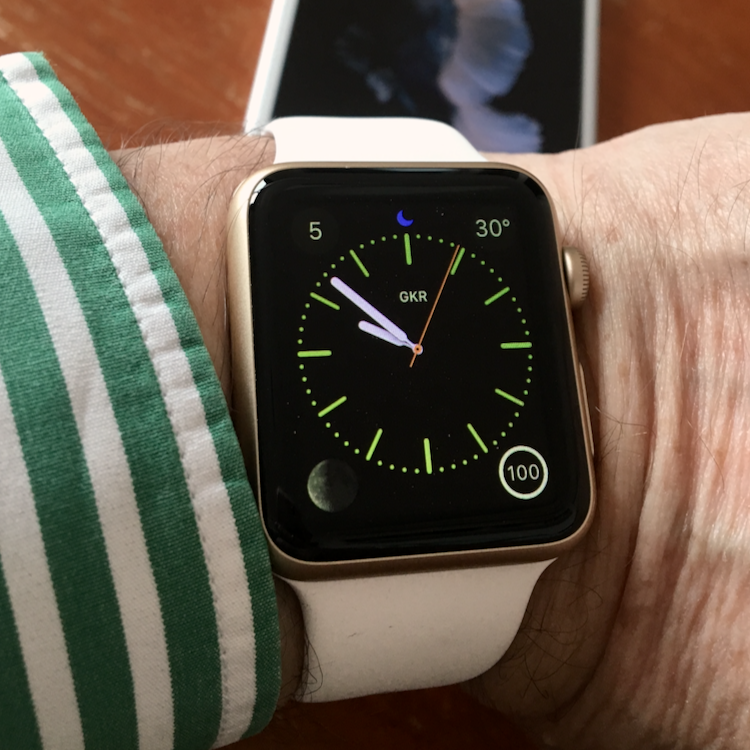
|
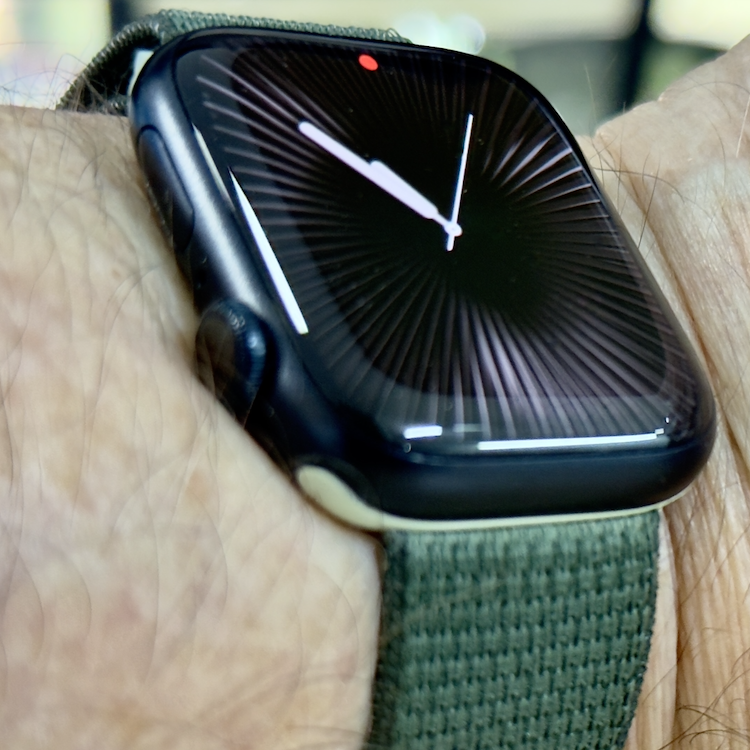
|
Later, when I had covid (clear rising temperatures and changes in heart rate), a visit to the hospital confirmed my guess and I was given medication. Fortunately this was at a time when Covid had become less life-threatening, but still a risk. This year, David Snow (Cult of Mac) reports that consultant psychiatrist, Amanda Faulkner, moved to a new Watch but thinking there was a problem with the device, initially ignored the high heart rate warnings, despite other symptoms (lesson here: don't), but the persistence eventually made her take heed and visit the doctor, who immediately sent her for tests.
 A few hours later she was diagnosed with leukemia. Note that my Watch did not diagnose my gall bladder stones, but the warnings I was seeing made me check. The warnings for Dr. Faulkner probably saved her life. A note in David Snow's article tells us that "Research at the University of Auckland is exploring how smartwatch data might be integrated into clinical practice."
A few hours later she was diagnosed with leukemia. Note that my Watch did not diagnose my gall bladder stones, but the warnings I was seeing made me check. The warnings for Dr. Faulkner probably saved her life. A note in David Snow's article tells us that "Research at the University of Auckland is exploring how smartwatch data might be integrated into clinical practice."
In August 2016, I reported on how Dr. Richard Milani was already incorporating Health Kit and the Apple Watch into the health approaches of Ochsner Health particularly with regard to sharing data with patients and improvements in post-operative care. He specifically mentioned the Apple Watch (this was 9 years ago, remember): As well as the normal exercise monitoring (running, flights of stairs), heart rate statistics are a good help. He added that, as more than half of patients fail to take all their medications, the Watch can also be used to provide reminders for patients, thus improving recovery rates."
Since that time, more features have been added to the Watch, like the ECG - information, not diagnostics - that, with Apple Health integration, allow more of us to keep an eye on our day to day health picture. We have also seen a number of reports on how the Apple Watch has saved people: often through heart problem warnings; but also through fall reports and other risk factors.
There is a famous scene in Ferris Bueller's Day Off where a teacher is explaining economic history to a class of high school students. Trying to draw the bored students out, he keeps repeating, "anyone, anyone" when he comes to a significant point that he hopes they had read up on (some hopes). He mentions the Smoot-Hawley Tariff Act (1930) that introduced tariffs. Rather than improve things, retaliatory tariffs made the Depression far worse. He also mentions the George H.W. Bush comment on what he called Voodoo economics (Daniel Liberto, Investopedia).
 From reports about the run up to the disastrous announcements last week - which saw no tariffs announced for Russia, or North Korea - the list appears to have been put together using IP domains, which explains why Gibraltar and Aruba are separate and why the penguin-only Herd and McDonald islands had tariffs announced. This of course has brought out some great memes, photos and cartoons, making a mockery of the underlying reasoning.
From reports about the run up to the disastrous announcements last week - which saw no tariffs announced for Russia, or North Korea - the list appears to have been put together using IP domains, which explains why Gibraltar and Aruba are separate and why the penguin-only Herd and McDonald islands had tariffs announced. This of course has brought out some great memes, photos and cartoons, making a mockery of the underlying reasoning.
The formula for calculating what the countries levied allegedly already charge the USA is questionable and unevenly calculated (Ben Berkowitz, Axios). Thailand is to have a tariff of 36% on US goods, but has a VAT rate of 7%. The UK which is only to be charged 10%, has VAT of 25% and the people there buy far more US goods on which VAT is charged. This does not even reach the level of voodoo economics, but we might call it ad hoc economics: it seems to have been made up as they went along.
"Trump's ego melts the global economy", writes Susan B. Glasser in a strong article from New Yorker. I think I should subscribe to this again just on the strength of this. From the information in this and the previous link about the formula, it sounds as if the administration were, or are making it up as they go along. Then, as Zac Hall (9to5Mac) reports, certain products from Apple, Dell et al are now exempt from the tariffs so the fears of $2300 or even $3500 iPhones have receded (AFP/Reuters/RTÉ).
The problem with such an ad hoc approach is that - apart from the unfairness - the unpredictability does not lead to stable markets. That may have brought about a problem with bonds (à la PM Liz Truss): fundamental underpinnings of the economy. Now we have a 90 day wait to see what comes next. Was it all a ploy to seem like a strongman and force the rest of the world to come to the negotiating table? That will not play well for the future.
Graham K. Rogers teaches at the Faculty of Engineering, Mahidol University in Thailand. He wrote in the Bangkok Post, Database supplement on IT subjects. For the last seven years of Database he wrote a column on Apple and Macs. After 3 years writing a column in the Life supplement, he is now no longer associated with the Bangkok Post. He can be followed on X (@extensions_th). The RSS feed for the articles is http://www.extensions.in.th/ext_link.xml - copy and paste into your feed reader.

For further information, e-mail to
Back to
eXtensions
Back to
Home Page